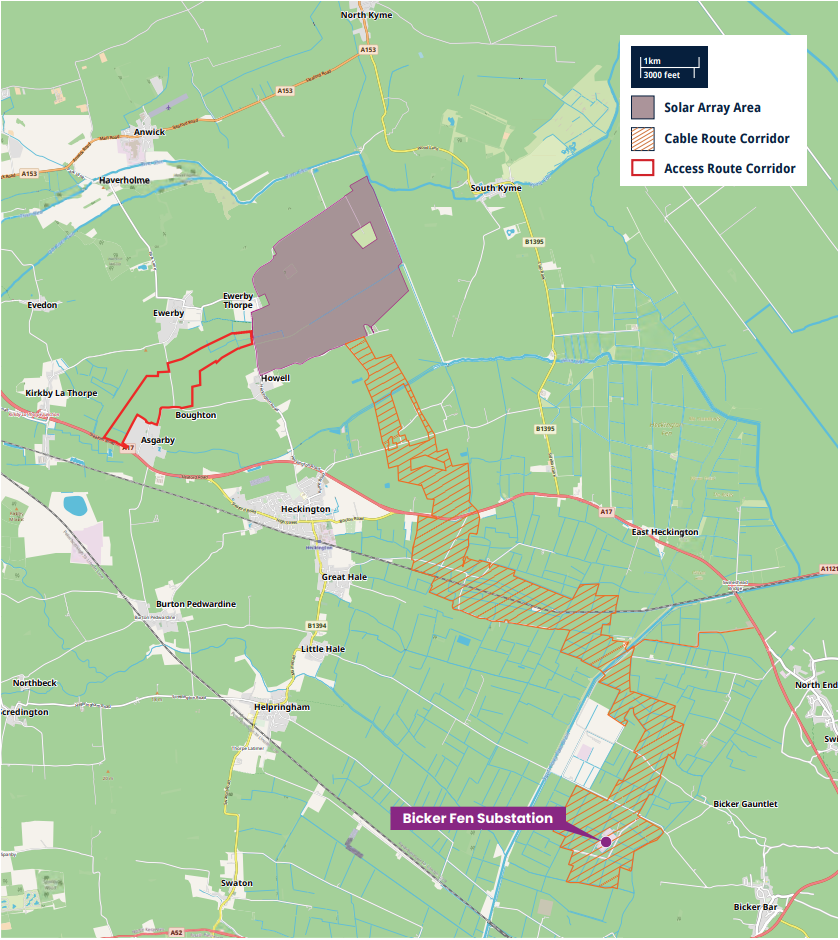Communities have been reminded to give vital feedback on refined proposals for a new renewable energy park, being developed by Low Carbon, which could power 130,000 homes with clean electricity.
Scores of people have taken part in the statutory consultation for the proposed Beacon Fen Energy Park, which is east of Ewerby and 4km east of Sleaford, and will be made up of solar PV, co-located with energy storage.
The project’s statutory consultation launched on Monday, 22nd January and will run for six weeks to Sunday 3rd March. The final two in-person events and a webinar are scheduled to take place before the end of February for stakeholders and communities to attend and find out more information.
James Hartley-Bond, Director at Low Carbon, said: “We have been really encouraged by the number of people who have attended our events so far to find out more about Beacon Fen Energy Park. There is still time to have your say. We would welcome anyone who wants to find out more about the project to attend our remaining in-person events and webinar to speak with the team, fill out a feedback form or visit www.beaconfenenergypark.co.uk.”
As part of the statutory consultation, in-person events will be held at;
- South Kyme Coronation Hall, High Street, South Kyme – Wednesday, February 21st from 10am to 4pm
- Heckington Village Hall, 9-11 High Street, Heckington – Thursday, February 22nd from 2pm to 8pm
A remaining online webinar has also been organised for;
- Thursday, February 29th from 6.30pm – 8pm
Those wishing to attend the webinar can email info@beaconfenenergypark.co.uk. No registration is required to attend the in-person events.
Renewable energy company Low Carbon, which is behind the proposals, has confirmed that, if given permission, Beacon Fen Energy Park would generate an estimated 400MW of electricity, providing electricity to up to 130,000 homes while also avoiding up to 72,000 tonnes of CO2e emissions, annually. The proposals include a battery energy storage system (BESS) with a capacity of approximately 600 MW.
Network infrastructure will also need to be built as part of the project which will link to the Bicker Fen substation. An underground cable route to connect the energy park to the substation is proposed for land east of Heckington, while a new, bespoke access road is being proposed to reduce the impact on local roads.
The proposed bespoke access road will, initially, remove HGV traffic and abnormal indivisible loads (AILs) from local roads during the construction stage. We are considering applying in the DCO to retain the bespoke access road, at a reduced width, for the operational lifetime of the development and during decommissioning. This would have three ongoing benefits: removing occasional HGV movements from local roads during operation; allowing abnormal loads in the event a transformer were to fail during operation; and allowing HGV traffic and abnormal loads for decommissioning to avoid local roads.
As part of the consultation, communities and stakeholders are able to read and have their say on the project’s Preliminary Environmental Impact Report (PEIR). Hard copies are available to view at all in-person events, while a digital version of all materials provided at the events is available to view at www.beaconfenenergypark.co.uk/documents.
Feedback should be provided in writing via feedback forms which will be available at all in-person events and can be handed in to members of the project team on the day or posted via FREEPOST BEACON FEN ENERGY PARK to arrive before Sunday, March 3rd. An online feedback form will also be available at www.beaconfenenergypark.co.uk.
The amount of electricity Beacon Fen Energy Park could generate exceeds 50MW and is, therefore, classified as a Nationally Significant Infrastructure Project (NSIP). This requires Beacon Fen Energy Park to submit an application for a Development Consent Order (DCO) to the Planning Inspectorate.
The planning process for the project is expected to take around two years. Subject to achieving consent, construction would start no earlier than 2026.
